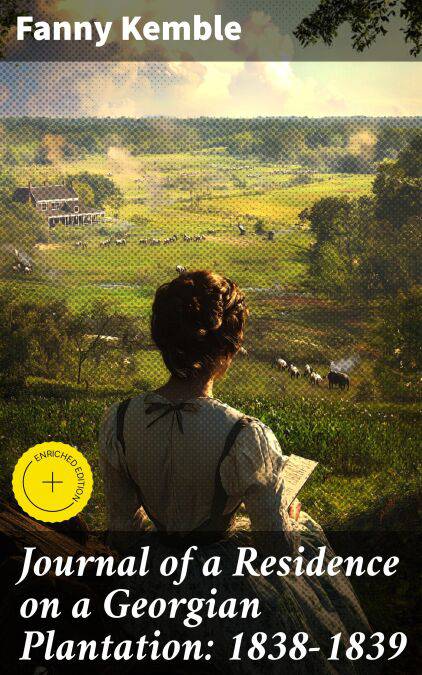
- Afhalen na 1 uur in een winkel met voorraad
- Gratis thuislevering in België vanaf € 30
- Ruim aanbod met 7 miljoen producten
- Afhalen na 1 uur in een winkel met voorraad
- Gratis thuislevering in België vanaf € 30
- Ruim aanbod met 7 miljoen producten
Zoeken
Journal of a Residence on a Georgian Plantation: 1838-1839 E-BOOK
Enriched edition. Exploring the Harsh Realities of Plantation Life in the Antebellum South
Fanny Kemble
E-book | Engels
€ 1,99
+ 1 punten
Uitvoering
Omschrijving
Fanny Kemble's "Journal of a Residence on a Georgian Plantation: 1838-1839" serves as a poignant and nuanced eyewitness account of life on a Southern plantation during a time of profound social and moral upheaval in America. Written in a reflective and observational style, Kemble's journal captures the complexities of plantation life, including the brutal realities of slavery and the intricate dynamics between slaves and plantation owners. Her prose is imbued with a sharp sense of irony and a profound empathy for the enslaved, offering an essential historical context that challenges contemporary notions of Southern gentility and prosperity. Fanny Kemble was not only a renowned actress and writer but also a vocal abolitionist who was profoundly affected by her experiences on her husband's plantation. Her first-hand observations came during her marriage to Pierce Butler, a prominent slaveholder, which inevitably influenced her perspectives on race, gender, and class. Kemble's privileged background allowed her unique access to a world that many sought to understand but few spoke of openly, making her documentation invaluable. "Journal of a Residence on a Georgian Plantation" is a must-read for those interested in American history, literature, and the lived experiences of women during this tumultuous period. Kemble's courage in narrating these truths provides critical insights into the moral dilemmas of her time, making the book an essential addition to any scholarly collection.
In this enriched edition, we have carefully created added value for your reading experience:
- A succinct Introduction situates the work's timeless appeal and themes.
- The Synopsis outlines the central plot, highlighting key developments without spoiling critical twists.
- A detailed Historical Context immerses you in the era's events and influences that shaped the writing.
- A thorough Analysis dissects symbols, motifs, and character arcs to unearth underlying meanings.
- Reflection questions prompt you to engage personally with the work's messages, connecting them to modern life.
- Hand‐picked Memorable Quotes shine a spotlight on moments of literary brilliance.
- Interactive footnotes clarify unusual references, historical allusions, and archaic phrases for an effortless, more informed read.
In this enriched edition, we have carefully created added value for your reading experience:
- A succinct Introduction situates the work's timeless appeal and themes.
- The Synopsis outlines the central plot, highlighting key developments without spoiling critical twists.
- A detailed Historical Context immerses you in the era's events and influences that shaped the writing.
- A thorough Analysis dissects symbols, motifs, and character arcs to unearth underlying meanings.
- Reflection questions prompt you to engage personally with the work's messages, connecting them to modern life.
- Hand‐picked Memorable Quotes shine a spotlight on moments of literary brilliance.
- Interactive footnotes clarify unusual references, historical allusions, and archaic phrases for an effortless, more informed read.
Specificaties
Betrokkenen
- Auteur(s):
- Uitgeverij:
Inhoud
- Aantal bladzijden:
- 323
- Taal:
- Engels
Eigenschappen
- Productcode (EAN):
- 4057664136282
- Verschijningsdatum:
- 18/11/2019
- Uitvoering:
- E-book
- Beveiligd met:
- Digital watermarking
- Formaat:
- ePub

Alleen bij Standaard Boekhandel
+ 1 punten op je klantenkaart van Standaard Boekhandel
Beoordelingen
We publiceren alleen reviews die voldoen aan de voorwaarden voor reviews. Bekijk onze voorwaarden voor reviews.








